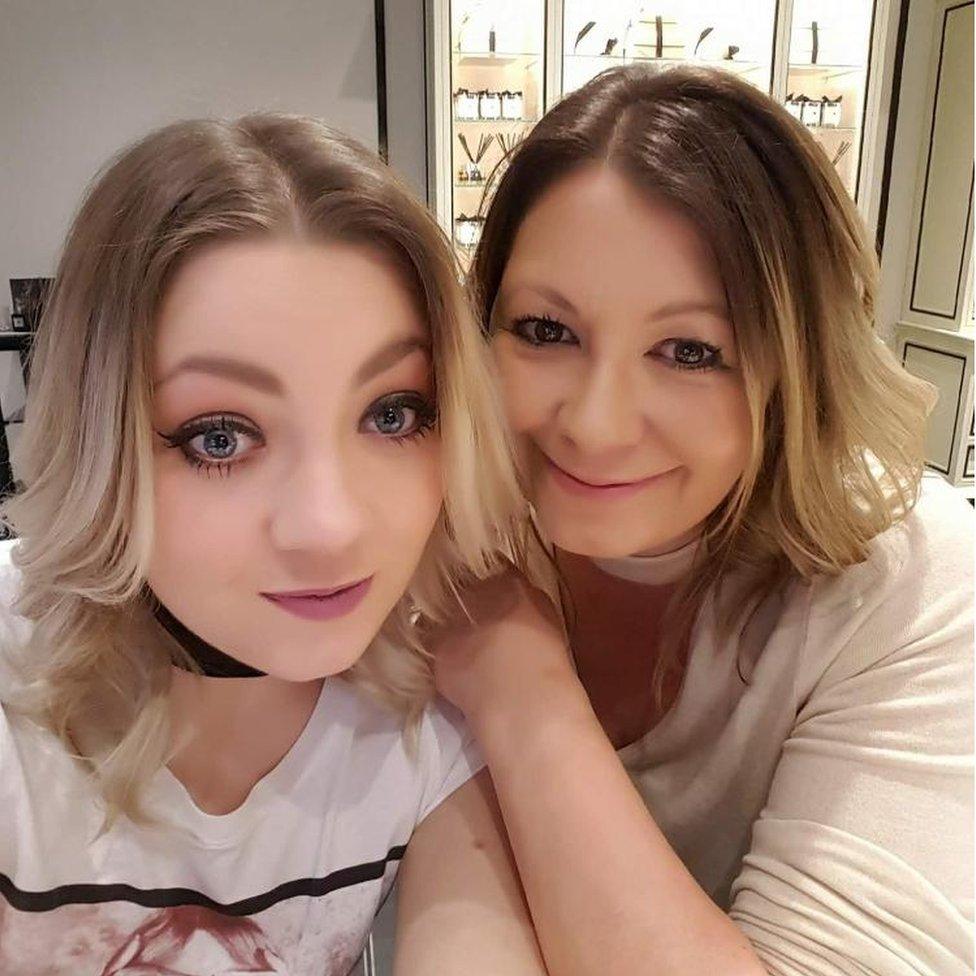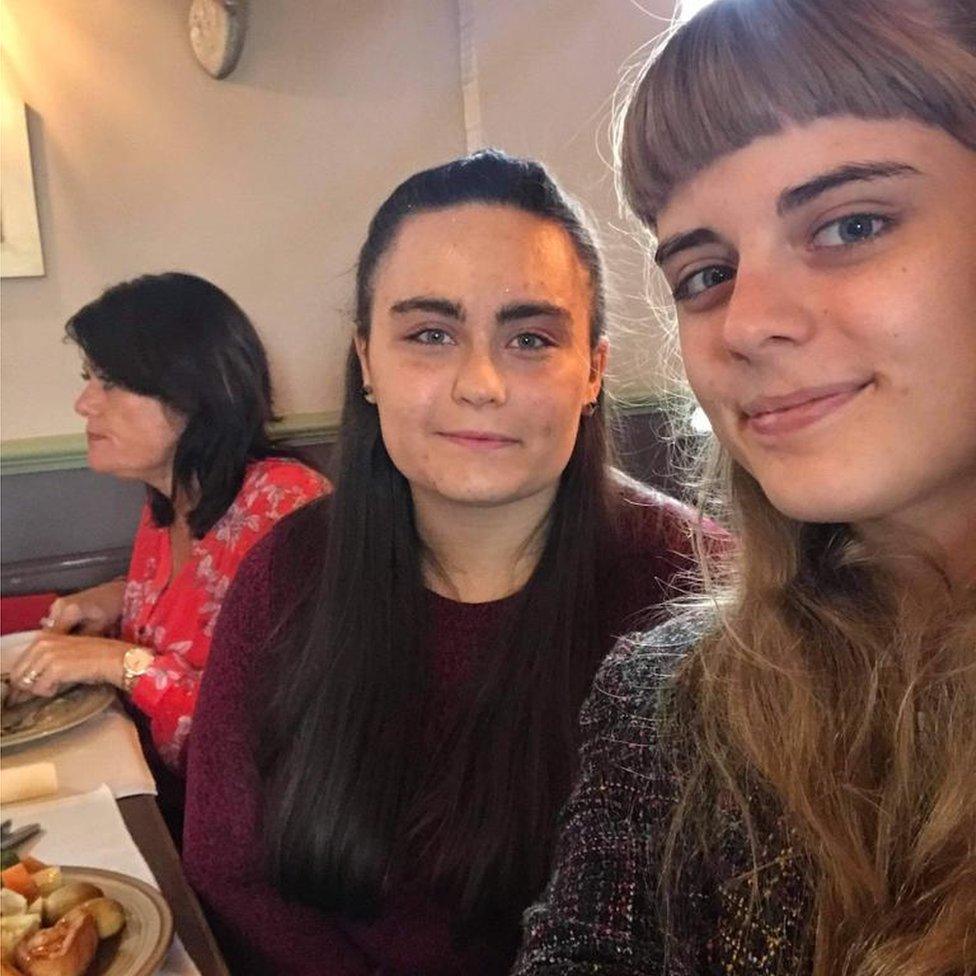Parosmia: 'Since I had Covid, food makes me want to vomit'
- Published

Clare Freer, when food and wine were still enjoyable
Many people with Covid-19 temporarily lose their sense of smell. As they recover, it usually returns - but some are finding that things smell different, and things that should smell nice, such as food, soap, and their loved ones, smell repulsive. The numbers with this condition, known as parosmia, are constantly growing, but scientists are not sure why it happens, or how to cure it.
Clare Freer ends up in tears whenever she tries to cook for her family of four.
"I go dizzy with the smells. A putrid smell fills the house as soon as the oven goes on and it's unbearable," she says.
The 47-year-old from Sutton Coldfield has been living with parosmia for seven months and it makes many everyday smells disgusting.
Onions, coffee, meat, fruit, alcohol, toothpaste, cleaning products and perfume all make her want to vomit. Tap water has the same effect (though not filtered water), which makes washing difficult.
"I can't even kiss my partner any more," she says.
Clare caught coronavirus in March last year and, like many people, she lost her sense of smell as a result. It briefly returned in May, but by June Clare was rejecting her favourite takeaways because they reeked of stale perfume and every time something went in the oven there was an overpowering smell of chemicals or burning.
Since the summer she has been living on a diet of bread and cheese because it is all she can tolerate. "I have zero energy and ache all over," she says. It has also affected her emotionally; she says she cries most days.
"Although the anosmia (loss of smell) wasn't nice, I was still able to carry on with life as normal and continue to eat and drink," Clare says. "I would live with that forever, in a heartbeat, if it meant being rid of parosmia."

Clare enjoying a pamper day with her eldest daughter - but perfume now smells revolting to her
Clare's GP said he'd never come across her condition before. Frightened and bewildered, she turned to the internet for answers and found a Facebook group with 6,000 members set up by the smell loss charity, AbScent.
Nearly all had started with anosmia arising from Covid-19, and ended up with parosmia.
"Common descriptors of the different parosmia smells include: death, decay, rotten meat, faeces," says AbScent founder Chrissi Kelly, who set up the Facebook group in June after what she describes as a "tidal wave" of Covid-19 parosmia cases.
People have used phrases like "fruity sewage", "hot soggy garbage" and "rancid wet dog".
Often they struggle to describe the smell because it's unlike anything they've encountered before, and choose words that convey their disgust instead.
Around 65% of people with coronavirus lose their sense of smell and taste and it's estimated that about 10% of those go on to develop a "qualitative olfactory dysfunction", meaning parosmia or a rarer condition, phantosmia, when you smell something that isn't there.
If this is correct, up to 6.5 million of the 100 million who have had Covid-19 worldwide may now be experiencing long-covid parosmia.

One theory about the origin of the horrible smells experienced by people living with the condition is that they are only sensing some of the volatile compounds that a substance contains, and that these smell worse in isolation. Their intensity could even be boosted.
For example, coffee contains sulphur compounds that smell good in combination with all the other molecules that give coffee its rounded and pleasant aroma, but not so good when smelled alone.
Working with a number of people from AbScent's parosmia Facebook group, Reading University flavour scientist Dr Jane Parker has found that meat, onions, garlic and chocolate routinely cause a bad reaction, along with coffee, vegetables, fruit, tap water and wine.
Most other things smell bad to some of the volunteers, and nothing smells good to all of them "except perhaps almonds and cherries".
They, and others with parosmia, repeatedly describe a few bad odours, including one that is chemical and smoky, one that is sweet and sickly, and another described as "vomity", Parker says.
Her research has also found that bad smells may stay with these parosmics, as they are called, for an unusually long time. For most people the smell of coffee will linger in their nostrils for a matter of seconds. For parosmics, it could stick around for hours, or even days.

Tips for coping with parosmia
Eat room-temperature or cool foods
Avoid fried foods, roasted meats, onions, garlic, eggs, coffee and chocolate, which are some of the worst foods for parosmics
Try bland foods like rice, noodles, untoasted bread, steamed vegetables and plain yogurt
If you can't keep food down, consider unflavoured protein shakes
Source: AbScent, external

Prof Barry Smith, UK lead for the Global Consortium for Chemosensory Research, says another striking discovery is what he calls "the 'fair is foul and foul is fair' aspect of parosmia".
"For some people, nappies and bathroom smells have become pleasant - and even enjoyable," he says. "It is as if human waste now smells like food and food now smells like human waste."
So what causes parosmia? The prevailing hypothesis is that it results from damage to nerve fibres that carry signals from receptors in the nose to terminals (known as glomeruli) of the olfactory bulb in the brain. When these regrow - whether the damage has been caused by a car accident or by a viral or bacterial infection - it's thought the fibres may reattach to the wrong terminal, Parker says.
"They are in the wrong meeting room! This is referred to as cross-wiring and it means the brain doesn't recognise the smell, and is perhaps programmed to think of it as danger."
The theory is that in most cases the brain will, over time, correct the problem, but Parker is reluctant to say how long it will take.
"Because so few people had parosmia before Covid-19, it wasn't studied very much and most people were unaware of what it was, so we don't have historic data. And we don't have data for Covid-19 because that could take years," she says.

Apart from waiting for the brain to adapt there is no cure, though AbScent believes "smell training" may help. This consists of regularly smelling a selection of essential oils, one after the other, while thinking about the plant they were obtained from.
Clare Freer has been doing this, and says lemon, eucalyptus and cloves have begun to smell faintly how they should, though she registers nothing for rose.
Some parosmics have adapted their diet, to make living with the condition more bearable.
Two sisters, Kirstie, 20, and Laura, 18, from Keighley, have taken this approach, though it took a while to work out how to do it while also living in harmony with their parents.
The sisters had to run around the house opening windows when their parents came home with fish and chips on one occasion, "because the smell is just awful" says Laura. Their parents, on the other hand, have been getting tired of the hot spices the sisters cook with, in order to mask unpleasant tastes, and to provide what for them is a hint of flavour - most pleasant tastes are fainter than they used to be.

Kirstie (right) and Laura on Laura's 18th birthday - Laura was unable to eat her nut roast
"Some people tell us just to power through and eat food anyway. We do try but it's very hard to eat food that tastes rotten," says Kirstie. "And then for the next three days I have to live with that smell coming through in my sweat. That's one of the most distressing smells, and I constantly feel dirty."
She and Laura have realised that plant-based foods taste best, and have been enjoying dishes such as lentil bolognese and butternut squash risotto.
"Meat is a big trigger food that we now avoid. Finding nice recipes we enjoy has made it much easier to cope," says Kirstie. "We've had to adapt and change our mindset because we know we might potentially be living with this for years and years."
Information and help
Jane Parker notes that loss of smell comes pretty low on the list of priorities for those dealing with the pandemic, but she and Barry Smith say it often affects mental health and quality of life.
"It is only when you lose your sense of smell that you realise how much it was part of the fabric of your experience," says Smith. Human connection, pleasure and memories are all bound up in smell, he points out.
"They [parosmics] tell you they feel cut off from their own surroundings, alien. They no longer find any pleasure in eating and lose that reassuring closeness of being able to smell the people they love."
While Clare Freer misses the days when she liked the smell of her husband as he stepped out of the shower, 41-year-old Justin Hyde from Cheltenham has never smelled the scent of his daughter born in March 2020.
Justin didn't attend the racing festival held in Cheltenham that month, but he knows people who did, and he caught the virus not long afterwards, losing his sense of taste and smell.

Justin will no longer be able to enjoy a visit to a beer garden
It had partly returned by July, but then coffee began smelling strange - and quickly things got a lot worse.
"Almost all smells became alien," he says. "Eggs physically repulse me and I'm unable to enjoy beer or wine as they have a flavour I simply call Covid."
Like Kirstie and Laura, he has found some meat-free dishes are edible, including vegetable curry, but there will be no more visits to beer gardens as long as his parosmia lasts, and no fried breakfasts or egg and chips.
"All those luxuries we take for granted have vanished since having Covid," he says. "I feel like I'm broken and no longer me."
Follow @KirstieJBrewer, external on Twitter